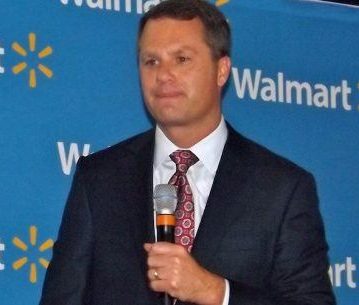Wal-Mart boss asks Wall Street for patience as it tests services like Uber, repairs U.S. business
by June 3, 2016 4:38 pm 365 views

Wal-Mart CEO Doug McMillon at a shareholder meeting in 2016.
Doug McMillon, CEO of Wal-Mart Stores, asked analysts representing large U.S. investment firms for patience as the retail giant tries to be nimble and test new services such as partnering with Uber and Lyft to offer home delivery of online grocery orders.
The so called “final mile” delivery using Uber and Lyft is being tested in Phoenix and Denver. Sam’s Club is testing a similar service from Deliv for its pickup option in the Miami market.
Execs with the Bentonville-based retail giant made the announcement Friday (June 3) at its annual shareholder meeting in Fayetteville. The customers in these markets already have grocery delivery as an option. Neil Ashe, CEO of Walmart Global e-Commerce, said customers will place their order online and those who chose home delivery will pay the $7 to $10 that Walmart already charges in those markets.
Walmart will outsource the home delivery to one of its final-mile partners — Uber, Lyft or Deliv who will make the delivery to the time chosen by the shopper.
Following the meeting at the question and answer luncheon, analysts wanted to know why now was the right time for these partnerships given that Walmart has previously said there is not really enough demand for delivery and pickup has been far better received in those markets that offer both services. Ashe said it’s about on-demand delivery and time will tell if customers really want this service.
“If it’s successful, we could roll it out to other markets,” he said.
Given the broad, geographic area of the U.S. Ashe said it’s difficult to pull off last-mile delivery for groceries. He said it’s like the cable guy, someone has to be there when the order is delivered. That said, home delivery works remarkably well in small, densely populated countries like the United Kingdom that has been providing grocery delivery for nearly a decade.
McMillon said being able to test new ideas is essential during the transitional time for retail. He said the company’s study of its competitors has long been part of its DNA.
SMART MOVE
At least two retail experts say it’s “smart” for Walmart to leverage its scale with those pioneers who have already built an infrastructure and fought the battles with cities and unions to employ crowd-sourced delivery models. Carol Spieckerman, CEO of Spieckerman Retail, said Walmart’s willingness to partner up on this shows the retailer’s nimbleness. She agreed there was a time Walmart management would have wanted to build out its own system.
“Walmart is smart not to attempt to build out this system, but rather partner with companies that have already done so. This is a case where Walmart can use its scale and not have to do the bulk of the heavy lifting,” she said. “It’s a win win.”
Clint Lazenby, founder of SyncUp, said using Uber and other companies is absolutely the best thing he’s seen Walmart do in a long time, noting that even if it doesn’t work, there is the potential for lessons learned with the partnership platforms. He said Uber and Lyft have already built the infrastructure needed for home delivery and it would make no sense for Walmart to try and recreate it.
Spieckerman expects to see more service suppliers finding opportunities in retail partnerships. Walmart said the customer who opts for grocery home delivery will not see the delivery service provider’s name as it will be branded as Walmart. She said just like private label brands are used by retailers to improve margins, not-branded, white label services such as the home delivery could become the next wave of solutions for retailers to tap.
“These partnerships make sense as Walmart is having to invest in this at a time when they are already investing so heavily in other areas,” Spieckerman said.
U.S. CHANGES, INVESTMENTS
Analysts also asked Walmart U.S. CEO Greg Foran to elaborate on how much more “blocking and tackling” would need to take place in the U.S. store fleet before the turnaround in the business could be fully seen.
Foran said he’s seeing far fewer “code red’s” in the stores he visits. He said 18 months ago when he began the job there were many stores he visited that would have rated a 4 or 5 out of 10. Admitting that tremendous progress has been made, he said it could be two more years before Walmart gets to the point where they no longer have to raise bar store performance.
He said Walmart’s operational strategies will only get the company so far. It’s the workforce that make the most difference and the ongoing investments the company is making in wages and training will continue to pay off, he said.
Analysts also wanted to know if Walmart was satisfied with its fleet of stores having exited the Express format earlier this year. McMIllon said a well run supercenter creates a runway and cash flow for the company that enables more investments in other areas like technology. He said winning in the U.S. is a priority and if something gets in the way of that, action will be taken.
“We don’t feel the need to expand the footprint we are in,” McMillon added.
